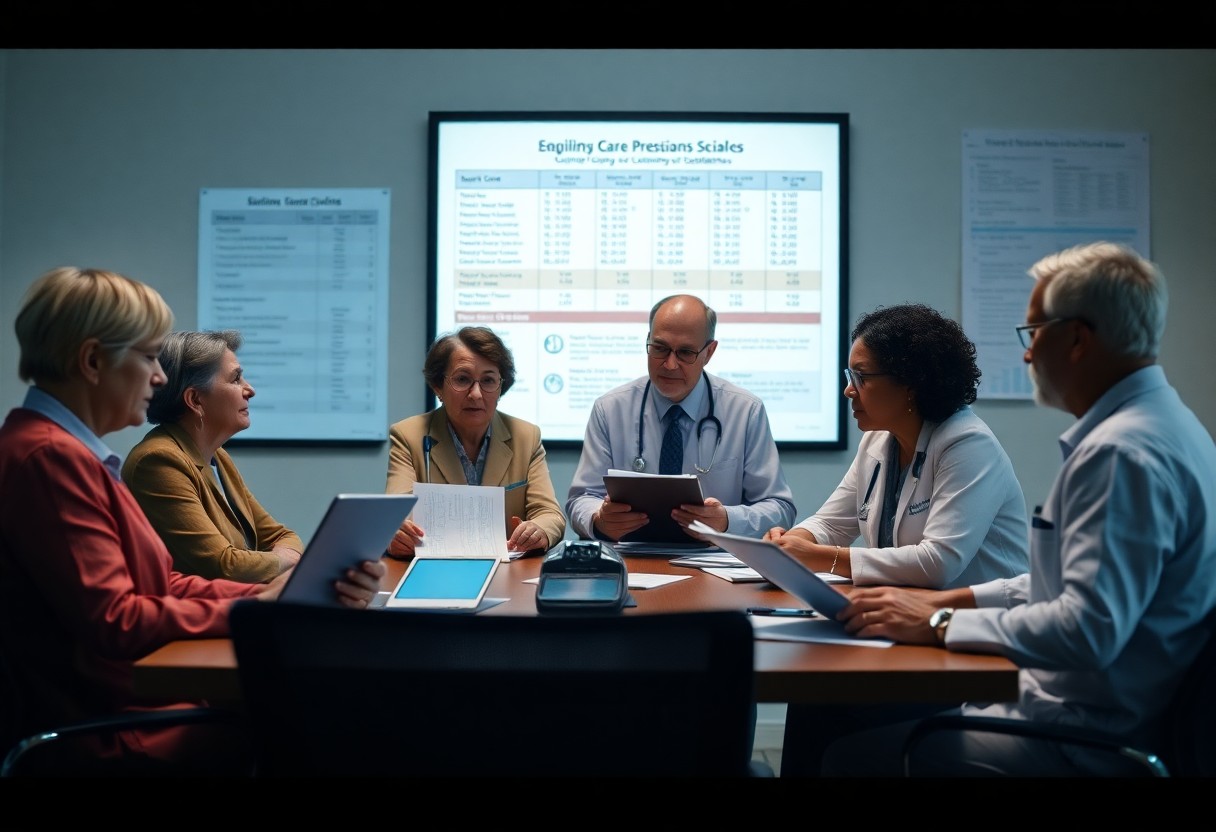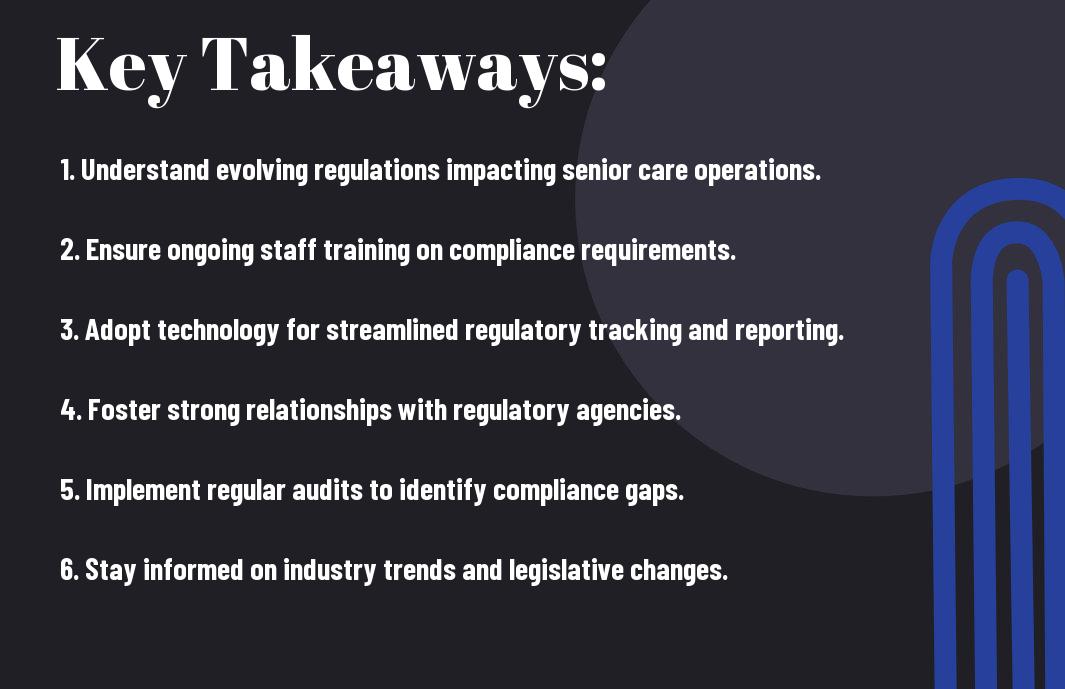Over the next few years, navigating the complex landscape of senior care regulations will require vigilance and adaptability. You’ll need to stay informed about rapidly changing compliance requirements that can dramatically impact your operations and care delivery. With potential legal consequences for non-compliance, understanding this evolving regulatory environment is vital for safeguarding your staff and residents. This blog post will provide you with important insights and strategies to ensure you remain proactive in your compliance journey.
Key Takeaways:
- Understanding the evolving regulatory landscape is crucial for senior care providers to maintain compliance and ensure quality care.
- Proactive engagement with regulatory changes can lead to improved operational strategies and better preparedness for inspections and audits.
- Collaboration with industry peers and regulatory bodies can provide valuable insights and resources for navigating compliance challenges effectively.

Understanding the Senior Care Regulatory Environment
Your ability to navigate the senior care regulatory landscape is vital for ensuring compliance and providing quality services. As regulations evolve, staying informed about the framework can help you not only avoid penalties but also enhance your organization’s reputation. Understanding the intricacies of this environment is key to delivering safe and effective care to seniors while aligning with legal requirements.
Key Legislation Affecting Senior Care
Legislation plays a significant role in shaping senior care, encompassing various laws that dictate how services must be delivered. Essential laws, such as the Older Americans Act and the Affordable Care Act, set standards for quality and access to care. By keeping abreast of these legal developments, you can better align your organization’s practices with federal and state mandates, thereby improving service quality and compliance.
Role of Federal and State Agencies
Care agencies are fundamental in enforcing regulations and guiding senior care facilities. They ensure that facilities meet state and federal standards, conducting inspections and providing resources to help organizations comply with laws. Violations can lead to significant fines or even loss of license, while adherence can bolster your facility’s reputation. It’s imperative to maintain open communication with these agencies to stay updated on changing regulations and best practices.
Also, federal and state agencies play a significant role in developing regulations that govern senior care facilities. They offer guidelines that cover everything from safety standards to staffing requirements, which must be strictly followed. Understanding the specific agencies relevant to your facility, such as the Centers for Medicare & Medicaid Services (CMS) and local health departments, can provide you with valuable resources. By fostering a cooperative relationship with these organizations, you can leverage their expertise to help your facility not only comply with regulatory demands but also improve overall care quality.
Compliance Challenges in Senior Care
You face numerous compliance challenges in the senior care landscape, influenced by constantly changing regulations and standards. With various state and federal laws to adhere to, navigating this complex environment can be daunting. Staying informed and proactive is crucial as you work to balance quality care delivery with regulatory expectations that impact your facility’s reputation and funding.
Common Pitfalls for Providers
Behind many compliance issues are common pitfalls that providers often encounter, including inadequate staff training, lack of proper documentation, and failure to stay updated on regulatory changes. These oversights can jeopardize the quality of care you deliver and can result in severe penalties if not addressed proactively.
The Impact of Non-Compliance
Senior care facilities face serious repercussions when non-compliance occurs. Understanding the gravity of these consequences is important; they can lead to fines, reputational damage, and even closure of your facility. Additionally, non-compliance can cause operational disruptions, negatively affecting your staff’s morale and the quality of care provided to residents.
Understanding the impact of non-compliance highlights its significant ramifications on your organization. It extends beyond financial penalties; legal actions can ensue, leading to loss of licenses and certifications. The emotional toll on residents and their families can also be substantial, as trust in your care facility is compromised. By prioritizing compliance, you not only safeguard your facility’s longevity but also ensure quality care for those you serve.

Staying Ahead of Regulatory Changes
Many professionals in the senior care industry understand that keeping up with regulatory changes is important for compliance and quality service delivery. The landscape is constantly shifting, and those who adapt promptly not only protect their organizations from potential penalties but also enhance the care provided to seniors. Staying informed about legislative updates, standards, and best practices is vital for maintaining your facility’s reputation and operational efficiency.
Importance of Continuous Education
On your journey to compliance, ongoing education is key. Regular training sessions and workshops arm you with updated knowledge on regulations, enabling you to implement necessary changes effectively. By investing in continuous education, you not only protect your organization but also improve the overall quality of care provided to your residents.
Tools and Resources for Compliance
Behind the scenes, a variety of tools and resources exist to streamline your compliance efforts. Utilizing software solutions, accessing industry-specific databases, and joining professional organizations can provide you with the insights necessary to navigate regulatory changes efficiently. These platforms offer updates, templates, and guidelines that are tailored to your specific needs.
Education plays a fundamental role in maintaining compliance in your senior care facility. Utilizing compliance management software can help track regulatory updates and deadlines, while subscription to industry newsletters and attending relevant conferences ensures you receive real-time information. Additionally, connecting with peer networks or mentors allows you to share insights and strategies that can aid your compliance journey. By leveraging these tools and resources, you can create an environment that reduces risks and enhances the quality of care your organization provides.
Best Practices for Regulatory Preparedness
To navigate the ever-changing regulatory landscape in senior care, it’s necessary to adopt best practices that enhance your organization’s compliance readiness. Engage your team in ongoing education and training, utilize technology for streamlined documentation, and maintain open communication channels to ensure everyone is informed about regulatory expectations. By fostering a proactive compliance strategy, you can mitigate risks and adapt swiftly to new changes in regulations.
Developing a Compliance Culture
Below, we explore the importance of cultivating a strong compliance culture within your organization. A commitment to compliance starts at the top and requires the involvement of all team members. By encouraging ethical behavior, transparency, and accountability, you not only meet regulatory requirements but also enhance your reputation and build trust with residents and their families.
Regular Audits and Assessments
Regular audits and assessments are integral to ensuring your compliance efforts remain effective. These evaluations allow you to identify any areas of weakness or noncompliance before they become significant issues. By conducting audits consistently, you can promptly update your practices to align with the latest regulations, enhancing the overall quality of care you provide.
In addition, regular audits help pinpoint specific areas where your organization excels and where improvements are necessary. They also serve as a valuable tool for fostering a culture of continuous improvement and ensuring that your staff members are always aligned with compliance objectives. Using data-driven insights from these assessments, you can proactively address potential pitfalls and enhance your operational efficiency, ultimately benefiting both residents and staff. By implementing a diligent audit routine, you take significant strides toward maintaining a compliant and reputable senior care organization.
Case Studies in Successful Compliance
Once again, successful compliance strategies in senior care can be illustrated through various case studies highlighting their positive outcomes. Here are some key examples:
- Company A: Improved state audit scores by 25% through comprehensive staff training programs.
- Organization B: Achieved a 30% reduction in incident reports by implementing a robust risk management framework.
- Facility C: Maintained 100% compliance with federal standards through regular internal assessments and audits.
- Community D: Enhanced resident satisfaction scores by 15% by fostering a culture of feedback and transparency.
Lessons from Leading Organizations
Compliance is a continuous journey, and leading organizations have demonstrated that fostering a culture of accountability, regular training, and open communication can empower your team to meet regulatory standards effectively. By learning from their practices, you can enhance your own compliance strategies and ensure a thriving senior care environment.
Innovative Approaches to Regulatory Challenges
Around the senior care industry, innovative solutions are emerging to address regulatory challenges effectively. These initiatives not only streamline compliance processes but also enhance service delivery to residents.
Studies show that technology integration is a game-changer in overcoming regulatory hurdles. For instance, organizations leveraging real-time data analytics can identify compliance issues before they escalate, improving overall safety. Furthermore, telemedicine has become a vital tool, enabling compliance with health regulations while enhancing access to care. Also, adopting a collaborative approach among staff facilitates knowledge sharing and boosts adherence to best practices. These innovative strategies not only improve compliance but also create a positive atmosphere for staff and residents alike.
Future Trends in Senior Care Regulation
For senior care providers, understanding the future trends in regulation is important to ensure you remain compliant. As the landscape evolves, expect increased scrutiny regarding patient safety, transparency, and quality metrics. Additionally, innovations in technology will drive regulatory adaptations, as oversight bodies aim to address the digital transformation in care delivery.
Anticipating Changes in Legislation
Trends in legislation are emerging that reflect society’s growing emphasis on the rights and dignity of seniors. You should stay informed about potential changes in funding models, staffing regulations, and elder abuse protections, all designed to elevate the standard of care in senior communities.
Preparing for the Next Generation of Compliance
Preparing for the next generation of compliance involves adopting forward-thinking strategies that align with evolving regulations.
Generation after generation, senior care regulations are adapting to the changing needs of the elderly population. You must focus on enhancing your compliance structures by investing in training programs that educate your staff about new policies. Additionally, you should incorporate technology solutions that streamline documentation and reporting processes. By embracing these shifts, you not only comply with the latest standards but also improve care delivery, positioning your organization as a leader in a competitive landscape.

To wrap up
Conclusively, staying ahead of compliance in the senior care landscape requires you to actively engage with the latest regulatory changes and adapt your strategies accordingly. By developing a thorough regulatory roadmap, you can ensure that your organization meets current standards while anticipating future challenges. For more insights, consider exploring Navigating the Evolving Landscape of Regional Healthcare Data Regulations. This proactive approach will not only enhance your compliance readiness but also improve the quality of care you provide.
Q: What is the Regulatory Roadmap in the context of senior care?
A: The Regulatory Roadmap is a strategic framework designed to help senior care providers navigate the complex and ever-changing landscape of regulations and compliance. It outlines key regulations, standards, and best practices that organizations must adhere to in order to provide high-quality care while ensuring legal compliance. This roadmap serves as a guide for senior care facilities to stay updated on new regulations, assess their current practices, and implement necessary changes to remain compliant as the industry evolves.
Q: How can organizations stay ahead of compliance challenges in senior care?
A: To stay ahead of compliance challenges, organizations can adopt a proactive approach by regularly reviewing and updating their policies and procedures in response to new regulations. This includes participating in training programs to increase staff awareness of compliance requirements and utilizing technology solutions to streamline compliance processes. Additionally, engaging with industry associations and attending conferences can provide valuable insights into emerging trends and regulatory changes that may impact senior care.
Q: What role does technology play in regulatory compliance for senior care providers?
A: Technology plays a significant role in enhancing regulatory compliance for senior care providers. By employing electronic health records (EHR) systems and compliance management software, organizations can automate data collection and reporting, thus reducing the likelihood of human error. Moreover, these technologies facilitate easier tracking of compliance metrics, enable timely updates on regulatory changes, and support training initiatives. Ultimately, leveraging technology helps senior care providers maintain high standards of care while ensuring adherence to evolving legal requirements.







